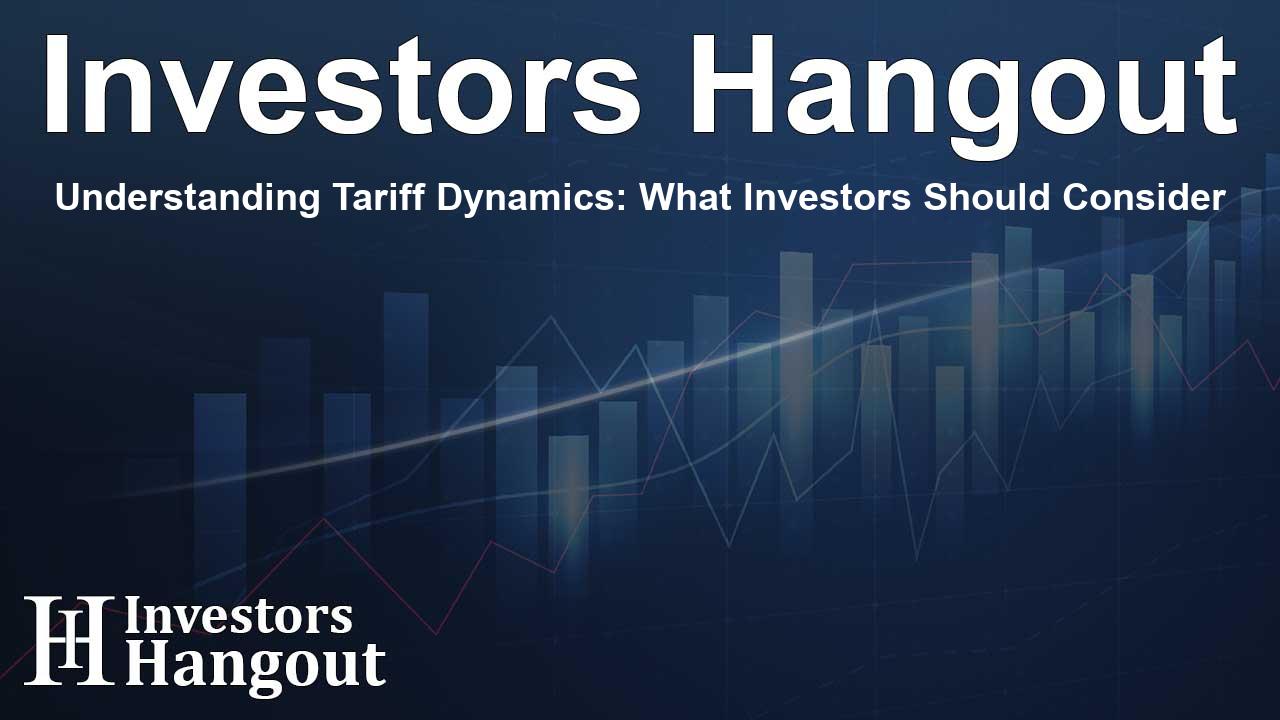Understanding Tariff Dynamics: What Investors Should Consider

Understanding Tariff Dynamics: What Investors Should Consider
In the world of investing, understanding the impacts of tariffs is crucial for navigating market movements. Recent insights suggest that the stock market's positive momentum may have less to do with the absence of imminent tariff announcements from the current administration than some believe. Analysts from Sevens Report have indicated that while there appears to be a temporary reprieve, the potential for tariff-related market turbulence still looms on the horizon.
The Current Market Scenario
Recently, investors have reacted favorably due to the lack of immediate tariff threats as the new administration takes office. This optimism has led to some speculation that the fears surrounding tariffs may have been exaggerated. However, according to Sevens Report, this perspective might be too simplistic. They emphasize that it is essential not to let down our guard just yet, as the landscape for tariffs can shift rapidly.
Volatility and Future Risks
Sevens Report highlights that any expectations of a stable tariff environment should be tempered with caution. Analysts pointed out that the absence of announcements during the early days of the administration does not equate to a long-term resolution. Many factors will determine how tariffs will play out and could lead to increased market volatility in the coming months.
Legal Considerations for Tariffs
One important element in the tariff discussion is the legal framework governing their implementation. The Power to impose tariffs is not unilateral; it requires a legal basis that must be established. The current administration must navigate existing trade treaties approved by Congress, making it challenging to enact tariffs swiftly or without careful consideration. Trump's directives to federal agencies to review trade practices will be crucial as the administration evaluates its options and potential violations.
Historical Context: Learning from the Past
The historical context of tariffs provides valuable lessons as well. For instance, during Trump's initial term, the S&P 500 faced a notable drop of 5% after tariffs were imposed on China back in 2017. At that time, the market was somewhat more stable, buoyed by a forward P/E ratio of around 17X-18X. Fast forward to the present, and we see a higher valuation range of 21X-22X, which, according to analysts, leaves little margin for error in market reactions to tariff news.
The Bigger Picture for Investors
While the absence of immediate tariff actions may have temporarily soothed market sentiments, the long-term consequences cannot be ignored. Sevens Report argues that the risks tied to poorly executed tariffs could exacerbate inflation and decelerate economic growth. Investors need to remain vigilant about the potential for sudden shifts in policy or announcements, as these events can significantly impact market stability.
Staying Informed and Agile
In conclusion, the ongoing discussions around tariffs are more than just momentary fluctuations—they represent a complex interplay of politics, law, and economics. Investors must stay informed and prepared for whatever moves may come next. Until there is clear understanding of the current administration's plan regarding tariffs, it’s likely that we will continue to see headlines inducing volatility across the financial markets.
Frequently Asked Questions
What recent events have influenced market perceptions of tariffs?
Market perceptions have been influenced by the absence of immediate tariff announcements and the initial positive reaction from investors.
How do tariffs impact market stability?
Tariffs can lead to short-term market volatility, especially if announcements cause uncertainty or are poorly executed.
Why is the legal framework significant regarding tariffs?
The legal framework restricts the administration's ability to unilaterally impose tariffs without due process and proper justification.
What historical trends should investors watch for in tariff announcements?
Investors should consider the historical volatility in the S&P 500 and the market responses to past tariff implementations.
What strategies can investors adopt in the face of tariff uncertainties?
Staying informed, flexible, and ready to adjust investment strategies in response to tariff-related news is key for managing risks.
About The Author
Contact Ryan Hughes privately here. Or send an email with ATTN: Ryan Hughes as the subject to contact@investorshangout.com.
About Investors Hangout
Investors Hangout is a leading online stock forum for financial discussion and learning, offering a wide range of free tools and resources. It draws in traders of all levels, who exchange market knowledge, investigate trading tactics, and keep an eye on industry developments in real time. Featuring financial articles, stock message boards, quotes, charts, company profiles, and live news updates. Through cooperative learning and a wealth of informational resources, it helps users from novices creating their first portfolios to experts honing their techniques. Join Investors Hangout today: https://investorshangout.com/
The content of this article is based on factual, publicly available information and does not represent legal, financial, or investment advice. Investors Hangout does not offer financial advice, and the author is not a licensed financial advisor. Consult a qualified advisor before making any financial or investment decisions based on this article. This article should not be considered advice to purchase, sell, or hold any securities or other investments. If any of the material provided here is inaccurate, please contact us for corrections.
